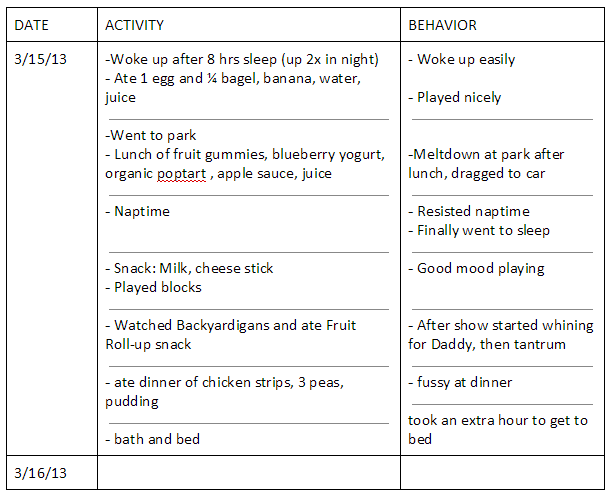The responsibility of raising children raises concerns. There are the daily issues like our child’s sleep, nutrition and safety. There are larger concerns of health and well-being that include our child’s development, temperament, resilience, or happiness. How can we, as parents, discern what our child needs, especially if they are off-track in some way, whether that be developmentally or with behaviors.
A Curious Parent
When immersed in the tasks of day-to-day life, it’s not always easy to see a bigger picture. Life with little people is full of distractions. Parents are rarely afforded the luxury of an uninterrupted thought. Each day is a blur of agenda items and tasks that meet the needs of those little people. By the time the parent’s head hits the pillow, it’s great that everyone has made it through the day safely.
Yet, many parents know that in a 3R’s family (respect, responsible, reliable), there can be more to feeling like a successful parent.
Be a Curious Detective
Sometimes, as parents, we are set on the way we want our child to react or learn to do something. Each child is a unique person with her own perspective and current developmental state. It’s more respectful to observe, be curious, and try to understand where the child is coming from. In this way, parents can appreciate the unique personality they are raising.
One role as parents is to be an advocate for your child’s needs and development. This means being a sleuth… a scout… a detective. It means looking for clues, asking questions, and using your intuition to observe and form a plan in regard to your child’s behavior, patterns, habits, spikes, or reactions.
You might protest. “I’m aware of my child and her behaviors practically 24/7. What could more observation possibly do?”
It’s not necessarily more observation, but the opportunity for reflection on the observations. Think back to all the events in the last day… even last week if you can. Details merge, moments blend, and the memories take on the quality of a watercolor wash. Recording the observations provides more detail for reflection.
Keep a Daily Detective Journal
For two weeks, keep track of your child’s activities and behavior in a journal – paper or electronic. Some people prefer a shareable document like a Google doc that is cloud-based and can easily be accessed by both partners. Others keep a notebook on a counter. It can be revealing and helpful to see what is happening while your child is with the other parent.
Make brief entries tracking notable events and actions. Activities might include sleep, food, elimination, and play. Behaviors might include moods, reactions, spikes, notable changes, and off-track behaviors. Here is a sample from a family I know with a 2-year-old daughter: 
What Are You Looking for?
After after you’ve accumulated 2-weeks of data, areas of interest to look for include spikes in behavior, mood patterns, or any repeatable responses.
When the above mother and I looked at the journal, we discussed a few patterns that were visible. What you see here are only a few entries. Looking at her journal over a 2-week period, there seemed to be patterns to her child’s emotional upsets. We both guessed there might be a link between television, her diet, and the tantrums. Nothing was conclusive but the mother took the suggestion to eliminate or greatly reduce the media and offer her daughter foods without added sugar. She also paid attention to bringing in more nutrition-rich foods like fruits, vegetables, protein, and whole grains.
When looking at your own detective journal, you can pay attention to internal and external influences.
Internal Influences
Child Development
Your child’s pace of development affects their behavior. Perhaps your child is hitting a milestone. The amount of energy and brain power this uses can affect her behavior. Also, the primary parts of the brain – reptilian and right – are most accessible to small children. When a child feels threatened or sees his desires as thwarted, he most easily moves into fight, flight, or freeze. That often looks like a tantrum or a meltdown. The reptilian brain likes movement and calming actions (taking 5 deep breaths). The right brain likes visuals, emotions, relationships, and the big picture. Focus on your child’s reptilian and right brain centers first before you re-direct or strategize with the less developed linear and logical left brain.
Health
There are many factors involved when your child doesn’t feel well. One use of the Daily Detective Journal is to get a survey of your child’s health. How often is your child sick? Does he tend to have the same kind of virus or infection (i.e., repeated coughs) or a variety of sickness. How much sleep is your child averaging per day. Are there common circumstances where he seems to contract more illnesses than others? Does he get often get hurt physically? Does he seem extra-sensitive to certain activities, locations, or events. All of these become more clear as you delve into recording daily life for a period of time.
External Influences
Food
Small children often go through a stage of “picky” eating. It can seem impossible to get a child in this stage to eat anything. Even if what they actually eat might not be the parent’s first choice, it often feels like victory if any food is ingested.
Food additives, dyes, sugar, and non-nutritive foods (junk food) all play a part in affecting children’s behavior – and not just after it’s been ingested but sometimes in the upcoming days, weeks, and even months.
One parent I know was baffled by her child’s outbreak of rashes. His favorite snack was HealthSmart Protein Chips. She had gotten them at the health food store and saw that there weren’t any preservatives. The only problem for her son was that the chips were made with soy flour – and it was determined he had an allergy to soy. She made the connection after keeping track of two weeks of diet, which led her to take her son in for an allergy test.
The goal is to purchase less processed foods. If you must purchase processed foods, organic varieties are free of artificial colors. And if you want to eat better and have a healthier family, there are a lot of books and suggestions on the internet to help you cook high quality meals right in your kitchen.
Take note in your detective journal of the predominant foods your children are eating. Do they eat a variety of color, texture, and food groups? Track the amount of additives as well.
Media
Screen media produces highly arousing, abnormal sensory input to the brain’s activating system. Negative effects of arousal include the release of catecholamines, increased vigilance and irritability, motor behavior problems, a decreased attention span, and sleep problems. What might not be troubling to us can be very difficult to process for a developing child. Young kids have an immature understanding of the distinction between fantasy and reality. Violence can sneak into seemingly benign children’s shows or movies.
If possible, read children’s reviews regarding content of a show or preview it yourself. Also, limiting or banning night-time media lessens the chance of your child seeing negative-impact visuals. Once something is seen, it can’t be unseen.
Contagious Aggression
Some children are highly sensitive to aggression in the classroom or group experiences. It can play negatively into a child’s undeveloped impulse control and big emotions. This can also be present in aggressive acts between siblings. There is a possible rise in cortisol – the stress hormone – just by being in an aggressive environment. This is not to discourage anyone from utilizing a daycare facility. This information is also not meant to keep your child away from groups. If, as a detective, you find that your child might be experiencing increased stress in this kind of situation. Daycare can be a very positive experience for kids and allow parents to work or have much-needed adult time. It’s important, though, to be aware of any negative effects on your child.
Stress
Gone are the care-free days of childhood. At least it seems that way, as children can easily build up pressure resulting from stress. As you review your detective journal, look for areas that might be adding extra stress to your child’s life. For example, sibling rivalry, fears, stuffing big emotions, and too many play dates or outings can sometimes do this.
Develop Pressure Release Valves. Note if there are certain activities, atmospheres, rituals, or absence of activities that helps your child decompress after a full day or stressful event.
The Bigger Picture
By looking at a larger picture of events, influences, and behaviors, you will more clearly understand your child and their needs. You will more easily be able to teach your child how to regulate their emotions, problem-solve and lead in social situations, and find healthy ways to release pressure and stress.
Please be clear that you are not only looking for negative or challenging patterns in your detective journal, but the positive ones as well. When is your child able to show emotional self-regulation or respond to your voice? What elements help to elevate their mood? What role do sleep, eat, and elimination play in the day?
Also, take on an overall attitude of curiosity. What is that unique perspective your child has on the world? What really interests them? How best do they learn? You can intuit, guess, and ask what is going on with the small child as ways to discern this perspective. But, ultimately, the child is the only one with that unique perspective. Our role is to understand, inquire, and empathize as best we can as our child learns to communicate with us and explore their inner world.
Trust
A key component of a Curious Detective is trust. As we question and discern, we learn that we can trust our child. There is a reason our child has a tantrum, even if that reason is immature or undeveloped. Often neither the parent nor the child can understand the motivation for a big emotion, but it is there, nonetheless. And our children can be participants in the process of growth and development. Encourage their participation on whatever level they can. You might be surprised at what solutions they contribute.
Commit to your Daily Detective Journal for at least 2 weeks. Most parents can carve out a small daily niche for a short period of time. Start today.
|

